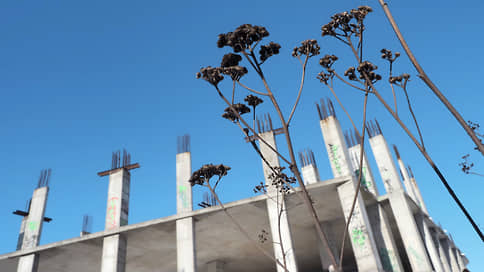The Supreme Court distributed the proceeds from the sale of land of bankrupt developers
[ad_1]

The Supreme Court of the Russian Federation (SC) cut from 95% to 60% the share of proceeds that banks receive from the sale of mortgaged land of bankrupt developers. It doesn’t matter whether citizens-shareholders remain in the register of creditors, or whether they have already been replaced by a fund for the protection of interest-holders – they are entitled to 25% of the income from the plots, the Economic Board of the Armed Forces specified. Moreover, it does not matter whether there were unfinished objects on this land. Previously, there was no single position on this issue in practice. Lawyers consider the decision of the Supreme Court correct from the point of view of the priority of the interests of equity holders and the fund that performs a social function.
The Supreme Court clarified how the proceeds are divided between the bank and equity holders from the sale of the developer’s land in bankruptcy. In February 2016, ZhSK Uralenergostroykompleks pledged two land plots to Primsotsbank under a loan of 80 million rubles issued by Stroyuniversal LLC. Both plots were burdened with equity participation agreements in the construction of apartment buildings.
Subsequently, Stroyuniversal and ZhSK went bankrupt. The bank got into the register of the first company with 81.3 million rubles. requirements, and to the second register – from 4.45 million rubles, since the pledged plots were estimated at this amount. Citizens-shareholders also acted as creditors of the housing cooperative, most of whose claims were bought out by the Fund for the Protection of Shareholders of the Sverdlovsk Region. The main dispute with the bank arose just as part of the bankruptcy of the housing cooperative.
The plots were sold at auction for 22.75 million rubles, of which the bankruptcy trustee paid the bank 4.45 million rubles. The bank disagreed with the amount, insisting that, according to the general rules of the bankruptcy law, the secured creditor is entitled to 80-95% of the proceeds from the sold property (depending on the availability of priority payments). The manager, however, believed that equity holders and the fund could also claim a portion of the proceeds.
The first instance supported the manager, but the appeal with cassation took the side of the bank. The courts explained that the estimated value of the pledge of 4.45 million rubles. is of an “accounting nature”, and the actual amount of payments depends on the actual proceeds at the auction, from which the bank is entitled to 80-95%. Shareholders, according to the courts, cannot claim money, since there were no unfinished construction projects on the disputed sites (for more details, see Kommersant of July 12).
The fund appealed to the Supreme Court, arguing that special rules for the bankruptcy of developers should apply here. Yes, Art. 201.14 of the law limits the share of mortgage banks to 60%, and another 25% of the proceeds from the sale of unfinished objects and plots on which construction was supposed to be used to pay off the claims of equity holders. The case was referred to the Economic Collegium of the Armed Forces, which canceled all decisions.
The Supreme Court acknowledged that, regardless of the presence or absence of unfinished construction on the land, the interests of equity holders should be taken into account when distributing proceeds from the sale of plots of a bankrupt developer: 60% is “guaranteed to go” to settlements with the bank as a collateral creditor, and 25% to repay the claims of equity holders. Since the fund bought the rights from the majority of citizens, it is entitled to claim participation in the distribution of “at least 25%” of the proceeds from the sale of land. The case was sent for a new trial to accurately calculate the amounts due to the parties to the dispute.
The Supreme Court resolved the problem of the correlation between the general and special procedure for the distribution of funds from the sale of real estate in developer bankruptcy cases, explains Anton Baturin, senior lawyer at BGP Litigation. There was no uniform practice on this issue. The fact is that “a literal interpretation of Art. 201.14 does not answer the question of whether such a distribution of proceeds is applied when selling land plots not involved in construction, ”specifies Mr. Baturin. He believes that “in order to provide increased protection for equity holders, this rule should be interpreted broadly.”
The absence of unfinished construction should not matter for equity holders to receive 25% of the proceeds from the sale of land, agrees the head of the bankruptcy practice of Intana Legal, Maria Mikheeva. She is sure that the board’s decision “provides a balance of interests of all the developer’s mortgage creditors, including equity holders”, and “the rights of banks are not violated.” Artem Komsyukov, the head of the Arbitrazh.ru office, also considers “the erroneous position of the courts, which decided that the absence of unfinished objects on the disputed land does not give equity holders the right to claim money from the sale of such plots.”
The situation was complicated by the fact that the law says about the allocation of part of the proceeds in favor of equity holders, but here the fund has already bought their rights, notes Anton Baturin: “But the Supreme Court took into account the direction of the fund’s activities and reasonably gave it an advantage over the bank.” Mr. Komsyukov adds that “it would be strange to give full priority to the bank, given the high social tension in developer bankruptcy cases.”
[ad_2]
Source link





